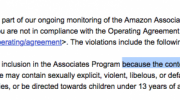
Image by exquisite vk photography.
It’s my opinion that one of the intersections in which we can truly see when big news outlets misbehave is when the subject is sex. This it not only my opinion, it’s my experience. I’m referring to when I worked at The San Francisco Chronicle (SFGate.com) and they ran an inaccurate story about a local news story about Kink.com. I responded with Kink.com and Porn Hysteria: The Lie of Unbiased Reporting (subsequently republished in Best Sex Writing 2008).
Today we have a pretty outrageous example from CNN.
Last week I noticed blogs mentioning a Japanese hentai manga video game that I remembered seeing in 2006. I wasn’t sure why. I remember that the game upset a lot of people for pretty obvious reasons: Rapelay was something we declined to cover on Fleshbot (I was blogging and editing there at the time). The game was later discontinued when mainstream Americans discovered the game in 2009. For reasons we can only guess, CNN ran a feature on it a week ago, prompting gaming blog Kotaku to openly ask Why Is CNN Talking About Rapelay?
CNN must not have heard the question.
Turns out the act of journalism perpetrated by CNN wasn’t *only* talking about a very old, sensationalistic story that had zero to no newsworthiness and treated viewers like bumpkins who never had internet access. The news item came across as a tidy character assassination on hentai manga, and Japanese sex culture. Then they followed up with an explanation about why the Japanese are scary perverts. The “reporter” is Asian, so CNN is ostensibly safeguarded against the presumption of racial xenophobia. Today a manga creator furiously responded in one of the most reasonable explanations of hentai manga I’ve ever read — most especially about these very sexual extremes which are trafficked in Japanese porn, and make us Americans the most uncomfortable.
It’s my conclusion that this discomfort is exactly what out of touch outlets like CNN and their “journalist” count on as foils for their own accountability with subjects like these. The funny thing is, the letter from the hentai manga creator is far more interesting and informative than the CNN piece. A piece I probably could have done 1,000 times better in my sleep. But don’t listen to me, I’m just a blogger. Listen to Takeshi Nogami in Manga Creator Blasts CNN For Being “Offensive” And “Insulting” snip:
“As a Japanese citizen,” he continues, “I am deeply offended by the insulting implications of that so-called expert who associates Japanese people at large with heinous criminals.” He points out:
As this objection had to be put together promptly, precise data will be presented later, but it is a fact that in this 21st century, we Japanese enjoy one of the most safe and peaceful societies on Earth. Naturally, that is not to say that our society is without problems, but to be honest, I frankly do not think that you are the ones to tell us. (…) “Is hentai detrimental to the upbringing of children? Yes,” he writes, “it some circumstances it may well be the case. It certainly true, for instance, of that game you reported about. I am an average citizen with a younger sister and two nephews; I can relate to your concerns. And precisely as such, I beg to differ with your argument.”
“Those products are developed for rational adults,” he writes. “You surely don’t believe that a rational adult would be influenced by such a game into committing rape, do you? Of course, in Japan, both that game you reported about and the hentai manga I draw are only distributed and sold under strict age restrictions to adults.” In Lah’s [CNN] reporting, none of these issues were part of the dialogue.
“That your children might obtain such materials on the Internet is a trouble for us as well,” he points out. Because, he continues, those are pirated copies. “We would be grateful if you could let families and schools issue proper warnings to children. And would it be too much to ask that appropriate age restrictions are put in place in stores in your country so that the rational adults can buy legitimate copies?”
(…) We make works of art. Let me say that again. It is just art. I assume that you are capable of distinguishing fiction from reality like we do. Are you not?” (…read more, kotaku.com)





Women’s rights activists are the ones trying to erase this Rapelay game off the face of the earth. They ignore the fact that maybe a few deviant women out there (sexually free, but not criminally insane) might enjoy playing it, maybe even more than men do. After all, (most) women don’t have penises, but some women might fantasize about having one and using it freely. The irony is that in this case, women’s rights activists are taking away from women’s rights!
Re the myth of unbiased reporting:
I see it in my own area of interest, which is the political situation in Palestine. If you go look at the eye-witness reports and raw statistics, you get a very different view than most media sources. I talked to a CNN reporter in while in Bethlehem, she said that by direction of home-base (US), local media _must_ refer to illegally colonized territory as “Jewish settlements” and/or the area as disputed. Fox, of course, is nuts. I haven’t looked today, but repeatedly, 15 of the 15 Fox articles in the UN section were heavily biased, against. Fox viewers outnumber CNN viewers 4:1, and both sets think they know the truth about an issue, because they have free press!
M,
You’ve also got to recognize the studies that show safe outlets for behavior reduce unsocial behavior (think negative correlation between broadband access and rape incidents of rape).
Furthermore, look at the rates of rape reported in Japan. Now, i’ll be the first to admit that due to the community oriented Japanese culture, rapes tend to be under-reported. But at a reported rate of 1.78 per 100,000, versus the United States 32.05 (and Canada’s 78.08), Japan could be reporting only 10% of their rapes, and STILL have half as many as the United States. So I don’t think we’re in any position to criticize.
The one significant area in which Japan fails is in human trafficking; but again, we’re in no position to talk. The human rights websites I’ve seen that compile data on hotspots for trafficked women always seem to have a big black spot on their maps where the U.S. should be. And yet, somehow I think that in places like San Francisco, Las Vegas, and Miami, we are Japan’s equal in the slave-trading. While I have no solid data at hand to back it up, I somehow doubt there’s very much of a connection between people who sit at home and play video games involving rape, and those who would utilize services of trafficked women for sex.
(Sxipper, where did you lose my k?)
@m
In any case, this is about CNN’s sloppy, sensationalist reporting, not a debate over questionable links between video games and real-world violence.
@m
“It has already been proven that video games desensitize people to the violence depicted” [citation needed]
Im sorry, but to assume “rational adults” aren’t affected by this game in how they view the subject of rape is the height of ignorance. Art or any kind of representation influences how people think, you cant just assume because it isnt “real,” it’s ok and wont affect people. It has already been proven that video games desensitize people to the violence depicted; it doesnt take a genius to realize how troublesome this is to depict rape as a game. And as far a Japan being safe, while I agree that America has extremely high rates of sexual violence and that should be acknowledge, Japan also has a huge problem with sexual harassment and violence, but it is largely kept silent.